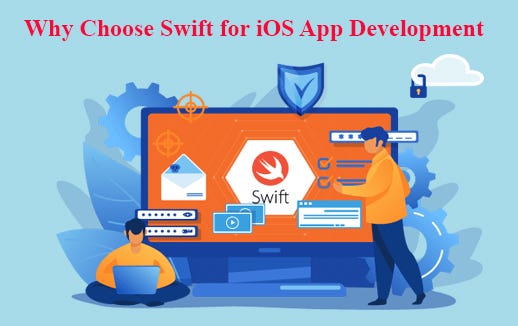Why Choose Swift for iOS App Development?
What is Swift: Apple, the most compelling tech company on the planet, began creating in 2010 and delivered Swift in 2014. Swift was expected as a language principally for iOS app development and everything Apple. It is an Open Source, broadly useful language which has immediately acquired popularity and engineers commitment since its beginning.

It uses the superior LLVM compiler innovation which is changed into local machine code. It has object-arranged highlights like classes, conventions, and generics among other key programming highlights like sorts, stream control, and administrators.
So what make Swift different than other languages:
Quicker, Easier Development: As its name suggests, it empowers SWIFT development. This means it plans to decrease development time with its readable, clean syntax, adaptability, and shields that forestall blunders while creating. It was created to replace the C-based languages like C, C++, Objective-C as the go-to language for Apple gadgets. It is in reverse viable and can be utilized in a current Objective-C code base effortlessly; Swift code coincides closely with your current Objective-C documents and works fine with the frameworks.
The development experience, with assistance from Xcode, gives amazing and instinctive programming. Swift playgrounds with Read-Eval-Print-Loop (REPL) make it simple and enjoyable to play with ideas and code. REPL makes the code intuitive by showing code results quickly.
Quick Performance: There is proceeded with banter on the presentation of Swift in contrast with different languages like C++ and Java. Negating results from benchmarks are wherever you look for benchmarks, clearly.
These benchmarks show that Swift beats Java on certain assignments mandelbrot: Swift 3.19 secs versus Java 6.83 secs yet is altogether more slow on a few binary trees: Swift 45.06 secs versus Java 8.32 secs. Nonetheless, one thing is sure, Swift is quicker than Objective-C and allegedly more than 8 times quicker than Python.
Swift guarantees runtime safety with automatic memory management. It guarantees that variables are constantly initialized before use, cases of the array or integer overflow are forestalled, and elite admittance to memory is reliably upheld. This forestalls some normal programming mistakes.
Swift means to forestall dangerous conduct by forbidding clashing memory access and giving techniques for express duplicating to determine any memory access clashes. This makes runtime special cases considerably less likely with the assistance of gather time mistakes.
Another safety feature highlight is that, by default, Swift objects can never be nil. A compile-time error from the Swift Compiler will prevent you from associating with a nil object.
Swift is more than just a Apple language: It’s a well known fact that Swift is the programming language of choice for IOS, macOS, WatchOS and TvOS. You can see the essential spotlight on Apple programming when opening up Xcode, to see that a large portion of the formats are for Apple Software.
In any case, it does have use cases a long ways past Apple. It is presently utilized for projects identifying with frameworks programming, Linux OS, mobile and desktop applications, cloud services, and server-side programming. Furthermore it is progressively being utilized for cross-platform application improvement with SCADE.
Swift as of now supports all Apple platforms and Linux, however with SourceKit-LSP, the community is also working attempting to incorporate Swift help into a wide variety of developer tools.
Swift Android Compiler: The Swift Android Compiler permits the Standard Library to be compiled for Android armv7 targets. Thus, you can execute the Swift code on cell phones running Android. This is the place where the Low-Level Virtual Machine (LLVM) Architecture comes in, empowering focusing on those with a backend LLVM compiler; something Google as of now does with Android App Development from C/C++. In this way, the LLVM furnishes a window into its similarity with different frameworks/programming/gadgets.
It fails to help the UI structures. Which means, you’ll end up revamping the UI/OS-explicit parts for Android. Subsequently, it is a rigorous business logic that this compiler deals with.
So in conclusion swift can be used for both iOS App Development and android App development. The LLVM compiler enables it to produce applications for both. In straightforward terms, this implies that any language that has a front-end LLVM compiler can be arranged for any objective that has a LLVM backend compiler.
Source URL:https://ennovationstechserv.com/why-choose-swift-for-ios-app-development/
Comments
Post a Comment